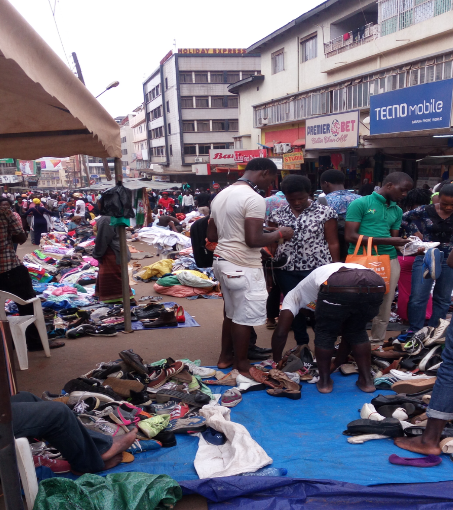Every Sunday Kampala Streets stretching from Barclays Bank to Kampala road on Luwuum Street is shut off and designated as a street market where vendors can hawk and sell their items. Items sold range from clothes for all ages, sexes, class_ both new and second hand clothes, shoes, bags, electronics, art, books and many other items except for food stuffs.
The market was introduced in 2015 by Kampala Capital City Authority (KCCA) to offer traders especially street vendor’s opportunity to earn money. In the recent past KCCA and street hawkers have had a series of clashes and also because of complaints from shop owners along the streets on which most of these vendors used to operate, the city authority was moved to come up with a solution for these hawkers hence the introduction of the Sunday street market. Anyone with anything to trade except for food stuffs is allowed space to carry out their business but this after paying a fee of 12,000 Uganda shillings. The fee is for service of hiring security for the market, secure bathrooms and cleaners.
Activities during the market day
Usually, by 10:30am the market is always in full drive, with a beehive of activity as vendors compete with each other in wooing customers as they shout on top of the voices. It’s a deafening experience with one’s ears filed with the surrounding noise from all corners of the gazette streets. “Sister tops za nkumi ssatu zoka! Aguze tops wano, beyi nkumi ssatu!”, literally meaning, (Sister here are tops going for 3,000 shillings per piece ) a vendor specializing in female blouses shouts on top of his voice in the early morning market as he tries to attract customers to his load.
Here traders devise different methods of wooing customers. Whereas others shout on top of their voices to attract buyers, there are those who come up with much more interesting ways like; corny songs about their products, others use persuasive names like; ‘sister’ or ‘baby’ for the ladies or ‘honorable’ for the men to draw their quick attention. In some instances, the traders have also introduced a method of hiring some people who rub together empty mineral water bottles that produce a noise that eventually draws the attention of customers.
Benefits of the Sunday Street market to traders
One of the vendors I talked to, one Kassim Mugerwa, who deals in second hand shoes says he is grateful for the Sunday street market because this market has seen him achieve certain things he did not think he would ever be able to achieve. Before then, Kassim says he used to hawk his shoes on the streets of Kampala at night and he would face a challenge of KCCA raids and confiscation of his merchandise.
However, with the introduction of the street market, he found a place where he could sell his items without any inconveniences. Kassim says although he is now able to afford a permanent place in Kajja market thanks to participating in the street market for 2 years now, he still makes it a point to come and showcase his goods in this market because he attributes some of his success to it. “Natandikila wanno nela nkyali wanno,” he says, which translates to “I started from here and I’m still here.” He says he can now more than before provide for his family of 8 people, including his 2 wives and 6 children.
What Customers say.
“The Sunday street market came as a blessing to me, I can now spend less for the same things I used to waste so much money on in boutiques,” one customer I found shopping for checkered blouses said. Many people have embraced the Sunday street market because of the low prices it offers. A denim shirt you’ll buy in a boutique at shillings 25000, you’ll get in the market at just shillings 5000 and also the market offers a variety of things in the same place, books, clothes, home furnishings like curtains and carpets, electronics and home appliances, bags, shoes, you name it. So, is the Sunday street market a blessing or what? In my opinion, it is, to both the vendors and the buyers, as it goes a good way in making people’s lives better.
Challenges of the street market.
The challenges of the Sunday street market is that Sunday is the most people rest from work so many people don’t venture out of their homes to go to markets. The vendors feel that if they had at least one other street market day, it would go a long way in helping them. They also feel that the fee of shillings 12,000 should at least be reduced to at least shillings 10,000. The other challenge is faced by vendors in the market that of shop owners whom they say still harass them. On this day, they don’t get any business because of the market; those who open their shops won’t get customers while some have resorted to not opening at all on Sundays.c



